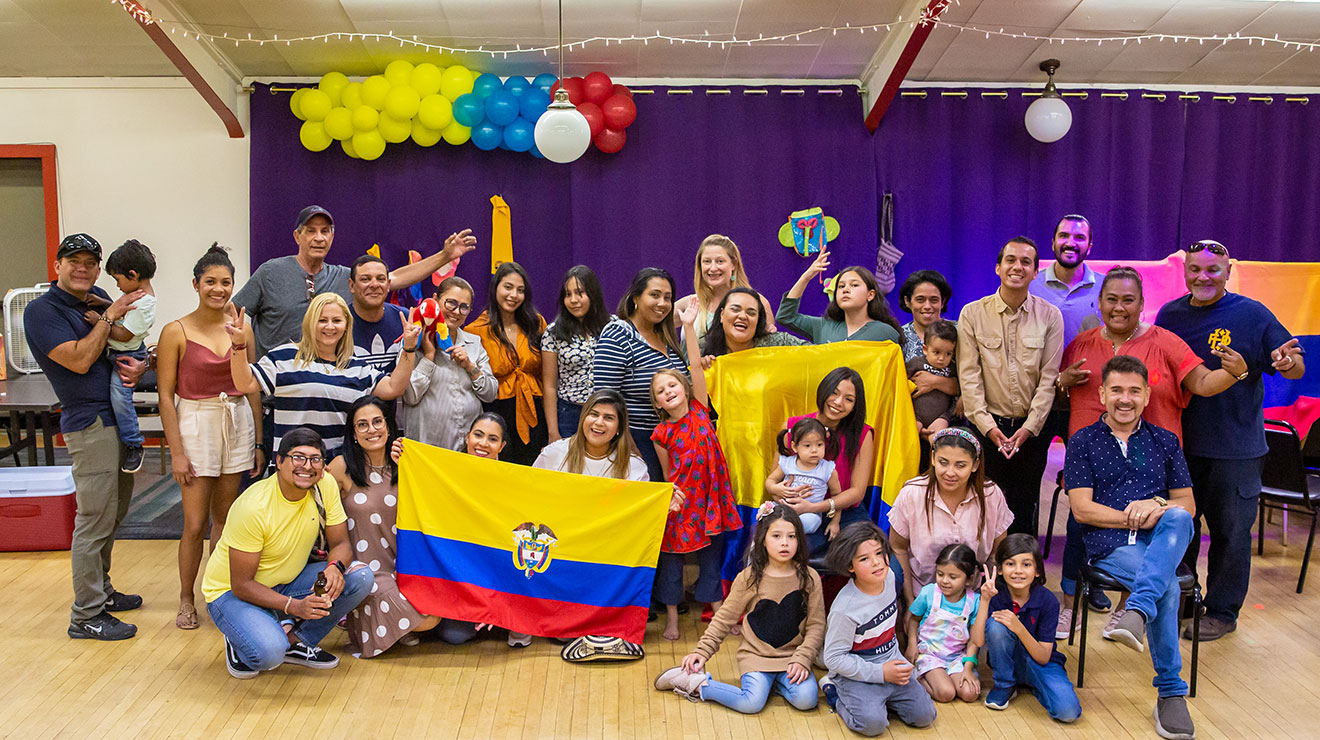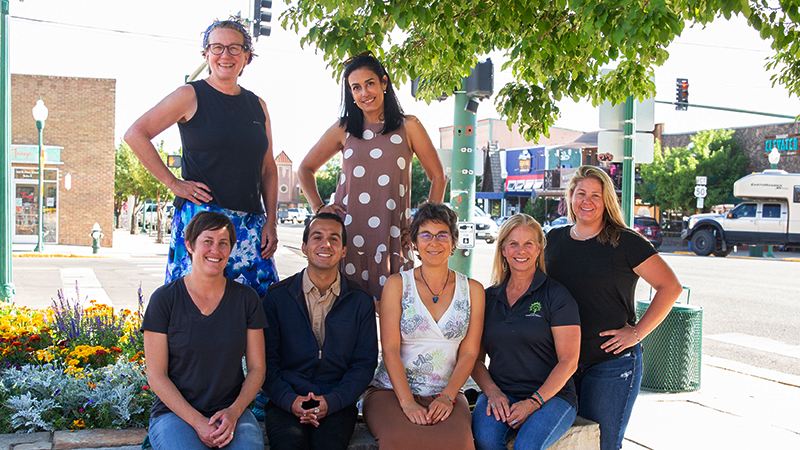
Gunnison’s growing Colombian population gathered on Aug. 12 through dance, food and music to celebrate their country’s independence day. Photos by Luna Anna Archey
Gunnison’s growing Colombian population gathered on Aug. 12 through dance, food and music to celebrate their country’s independence day. Photos by Luna Anna Archey
In the spring of 2020, when COVID-19 pandemic-conscious Gunnison residents were hunkered down in their households away from their friends, neighbors and normal activities, Gunnison City Manager Russ Forrest had an idea that seemed implausible at the time: “Hey, let’s have some fun!”
He called on a small group of creative, community-minded leaders to carry out this proposal. They agreed with him that COVID-19 shouldn’t be the only thing spreading around their town. So, they set out to spread joy.
The effort still has Gunnison residents dancing in the streets.
Spreading joy and, in the process, strengthening community ties has been the ongoing and expanding mission of the Gunnison Resiliency Project. Through the project, representatives of Gunnison Parks & Recreation, the Gunnison County Chamber of Commerce and the Community Foundation of the Gunnison Valley have found ways to build on pandemic-based “fun” ideas in this Western Slope ranching and college town, which usually gets more attention for its cold temperatures than for its unique community spirit.
Joyful events are continuing to make their way up and down residential streets in the form of Pied Piperish local bands playing music from towed flatbed trailers. Residents come out in their yards and streets to cheer and dance, or to follow the music cruises on their bicycles and skateboards.
Fun is being served up at potlucks that bring neighbors out to share their favorite dishes while the kids burn off steam in rented bouncy castles. A community garden has teamed with an immigrant group to showcase and eat healthy foods. Ethnic groups have shared their cultures in downtown events.
Townspeople have shown care for older adults and support for first responders through organized efforts to collect and deliver hundreds of handmade packets of artwork and encouraging messages.
Joy has popped up on yard and business signs bearing large red hearts and the message “Be Well” in both Spanish and English, or signs that say “Welcome” in 35 languages. It has shined in the glow from thousands of brown-bag luminarias—an event that has become a new tradition during the winter holidays.
“I told them to just get as fun as you can. Do whatever you can to put smiles on peoples’ faces. Reinforce neighbors taking care of neighbors, and communities helping communities,” Forrest said. “They got real creative with that.”
The Resiliency Project this year began paying for community-building events with “micro grants.” The grants—up to $400 per request—are going to individuals, neighborhoods, homeowners’ associations, businesses and nonprofits.
Ginny Baylor, supervisor of the Gunnison Parks & Recreation department and one of the driving forces behind the Resiliency Project, said she hopes the micro-grant program will become an ongoing fixture in the city budget.
“Connections are necessary for resilient communities,” Baylor said of the funding’s goal.
The city-funded micro grants paid for a patio picnic to celebrate the 40th anniversary of Six Points, a nonprofit agency that provides training for people with intellectual disabilities and traumatic brain injuries. Another grant paid for a community dinner at the Mountain Roots Food Project community garden, held in conjunction with Inmigrantes Unidos de Gunnison. A portion of these funds was used to buy a picnic table and umbrella so that gardeners will have a shady place to sit alongside the garden. Attendees of the dinner also received seedlings to plant in their home gardens.
Spanish-speaking immigrants taught Mountain Roots gardeners that pigweed is edible, and also prompted them to plant purslane, a green called verdolaga in Spanish.
The Resiliency Project and its resulting events and projects are “something special and unique about Gunnison. It’s great to get to know people on a more personal level,” said Izzy Rosenstein, who worked with Mountain Roots the past year and a half through the federal AmeriCorps program.
A homeowners association used a micro grant to hold a potluck block party early this summer. Another neighborhood nearby plans to hold one in September. That party will include music from a band featuring Cora community members. The Cora are an Indigenous population from a mountainous area of Nayarit, Mexico. Gunnison has the largest population of Cora in the country.
Until the Resiliency Project, the Cora had tended to mostly keep to themselves in their mobile home park neighborhoods. The Cora band is now a popular and in-demand feature of the community since it was the star of a music cruise this summer.
The music cruises became an early part of the Resiliency Project, inspired by piecemeal community events that livened Gunnison streets a decade ago. At the time, the community foundation was funding block parties that sometimes featured music. The events were designed to reinforce community spirit in neighborhoods during a very different time for Gunnison—no pandemic, no affordable housing crisis, an ample local workforce. It was a time when Gunnison was suffering more from economic doldrums.
Maryo Ewell, director of community impact for the Community Foundation of the Gunnison Valley, remembered the fun of those early community get-togethers and thought they fit the bill nicely for safe pandemic-era events.
“There’s plenty of data showing that neighborly ties are foundational in healthy, resilient communities,” Ewell said. “Sometimes it takes a crisis, though, for us to recognize that it’s all about people—about us and the folks who live next door. The time was just plain right for this.”
Ricardo Esqueda, a community outreach worker with the City of Gunnison, said the music “cruise nights” that began in 2020 have brought joy to many people around this town of 7,000.
“You get to see people be really happy when they come out and dance in front of their homes,” he said.
And, as Ewell shared: “A friend used to say, ‘The community that dances together will take chances together.’”
Along with the cruises, in early 2020, the Resiliency Project began a “Yard Love” effort. The project sold the “Be Well” yard signs with room to write a personal message. Baylor ordered 100 of the $4 signs, initially thinking that would be plenty. The project ended up selling 250. Some of them still stand in yards today.
“They were a big hit,” she said.
Other early efforts included planting petunias for people living at nursing homes. Three inspirational and informative podcasts were created for locals to listen to while walking or skiing. A glossy journal was produced that served as sort of a community yearbook.
“Community connection” packets went to older adults, front-line workers and delivery drivers. They included handmade art work, poems and homemade cards. Requests for submissions for those packets brought 370 emailed contributions in three weeks. The packets were delivered every Friday and some were displayed locally in grocery stores and a few other essential businesses that were open during the initial pandemic shutdown.
The Resiliency Project sold 7,000 luminarias in November 2020. The requests for the candle, paper bag and sand kits far exceeded what project organizers anticipated as they asked the community to offer each other “the gift of light.” About 800 of the luminarias were donated to teachers, pandemic service volunteers and other “community heroes.” The lights lined downtown, parks and neighborhoods and residential yards.
More Resiliency Project efforts are on the horizon. A cross-cultural celebration will be part of Mid Week on Main music event held in conjunction with Western Colorado University. International food and music will be featured and a proclamation about the importance of different cultures to the community will be read in languages that are spoken around Gunnison—Spanish, Cora, Hungarian, French and Popti, an Indigenous language from Guatemala. A downtown party will be held later this month to welcome university students to Gunnison.
The Colombian community in Gunnison, a population that now numbers about 50 people, applied for and received a grant to hold a celebration this summer in honor of Colombia’s independence day. Held on Aug. 12, the event served to show the rest of the community what is unique about the Colombian culture.
“We want people to understand us better,” said Mayte Burton, a Colombian who has lived in Gunnison for seven years.
All this has spread joyful ideas beyond the city limits of Gunnison and lately has garnered some national attention. Gunnison was selected to be one of a handful of rural communities to participate in the national Welcoming America initiative, which works to foster neighborhood ties in communities with notable immigrant populations. The multicultural event in September will celebrate that.
Forrest said he recently met with the police chief and fire chief to talk about how to prepare for other future emergencies, be they another serious wave of COVID-19, a fire or a flood. One thing they asked Forrest for was a continuation of Resiliency Project efforts.
“They said, ‘Double down on it. Keep doing it,’” Forrest said.
“They felt the Resiliency Project was a concept to build upon in the future to achieve that institutional and individual support. Fundamentally, we need to have neighbors support neighbors [and] neighborhoods support the community as a whole when the chips are down.”
Esqueda agrees that it is important that the focus on community fun and connection continues.
“We’ve been through hard times, and sometimes I feel people still have trouble with that,” Esqueda said. “I am glad that we can create spaces for people to be happy about life again.”

Gunnison Resiliency Project supporters (l. to r.) Lauren Kugler, Elizabeth Gillis, Ricardo Esqueda, Mayte Arzuza, Marketa Zubkova, Faith Saltmarsh and Ginny Baylor.